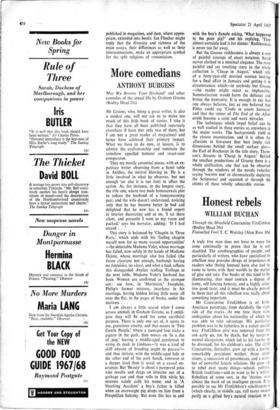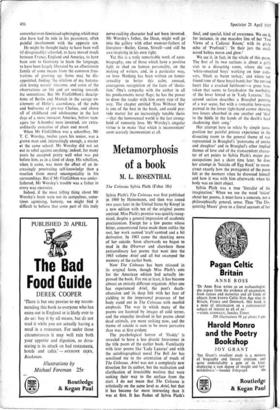Honest rebels
WILLIAM BUCHAN
Through the Minefield Constantine FitzGibbon (Bodley Head 30s) Flannelled Fool T. C. Worsley (Alan Ross 30s) A truly free man does not have to wave his arms continually to prove that he is not shackled. The autobiographies of people, and particularly of writers, who have specialised in rebellion may provoke shrugs of impatience in readers who (being human) have also had to come to terms with their worlds in the matter of give and take. For books of this kind to be illuminating, they must contain a degree of irony, self-lancing honesty, and a highly selec- tive good taste; and it must be clearly proved in them that all this rebellion was really about something important.
Mr Constantine FitzGibbon is of Irish- American parentage, from decidedly the right side of the tracks. At one time there were ambiguities about his nationality of which he was able to take advantage. His particular problem was to be fatherless in a rather special way. FitzGibbon pere was removed from his son early on, not by death, but by tempera- mental divagations which led to his having to be divorced, for his children's sake. The child Constantine, thereafter, grew up with a loving. remarkably percipient mother, three older sisters, a succession of governesses, and a num- ber of powerful female relations. He grew up to rebel over many things—school, politics. British traditions—and to want to be a writer. Rebellion of some sort, in the 'thirties, A435 almost the mark of an intelligent person. It is possible to see Mr FitzGibbon's rebelliousness (which clearly, in middle age, still tastes sweet) partly as a gifted boy's natural reaction to a
somewhat over-feminised upbringing, which may also have had its role in his passionate, often painful involvement with the opposite sex.
He might be thought lucky to have been well (if disagreeably) schooled, to have moved much between France, England and America, to have been sent to Germany. to learn the language, to have been largely liberated by an affectionate family of some means from the common frus- trations of growing up. Some may be dis- appointed, finding `the nihilism of my banana- skin loving nature' tiresome, and some of the observations on life and art veering towards the sententious. But Mr FitzGibbon's descrip- tions of Berlin and Munich in the savage ex- citement of Hitler's ascendancy, of the pubs and bedrooms of pre-war Chelsea, and above all of childhood and adolescence in the last days of a more innocent America, before teen- agers (or A-bombs) were invented, are extra- ordinarily evocative of place and mood.
When Mr FitzGibbon was a schoolboy, Mr T. C. Worsley, twelve years his senior, was a grown man and, interestingly enough, a master at the same school. Mr Worsley did not set Out to rebel against anything; indeed, for many years he accepted pretty well what was put before him, as in a kind of sleep. His rebellion, when it came, was more the effect of an in- creasingly penetrating self-knowledge than a reaction from moral uncongeniality in his surroundings. But if Mr FitzGibbon was under- fathered, Mr Worsley's trouble was a father in every way excessive.
Indeed, if the most telling thing about Mr Warsley's book were not its scrupulous, some- times agonising, honesty, we might find it difficult to believe that some part of this truly
nerve-racking character had not been invented. Mr Worsley's father, the Dean, might well go into the gallery with other monster-fathers of literature—Butler, Gosse, Sitwell—and still be awe-inspiring in his own right.
Yet this is a truly remarkable work of auto- biography, one of those which have a positive light to shed on human personality, on the making of writers, and, in a particular way, on love. Nothing has been written on homo. sexuality to better this calm, amused, courageous recognition of the facts of 'devia- tion.' One's sympathy with the author in all his predicaments never flags; he has the power to draw the reader with him every step of the way. The chapter entitled 'Eros Without Sex' is one of the best in the book, and could pro- vide matter for an increasingly tenable thesis —that the homosexual world is the last strong- hold of romantic love. Mr Worsley's singular virtue is to make `that which is inconvenient' seem scarcely inconvenient at all.







































 Previous page
Previous page